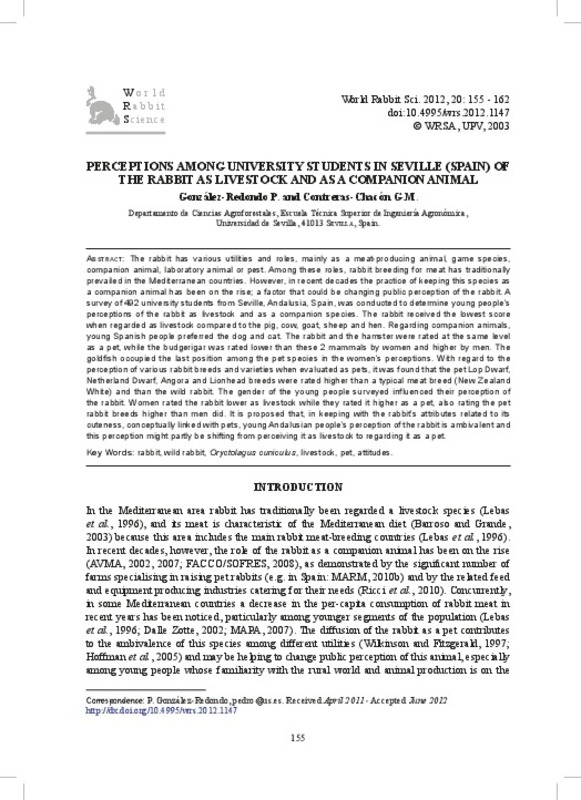JavaScript is disabled for your browser. Some features of this site may not work without it.
Buscar en RiuNet
Listar
Mi cuenta
Estadísticas
Ayuda RiuNet
Admin. UPV
Perceptions among university students in Seville (Spain) of the rabbit as livestock and as a companion animal
Mostrar el registro sencillo del ítem
Ficheros en el ítem
| dc.contributor.author | González-Redondo, Pedro
|
es_ES |
| dc.contributor.author | Contreras-Chacón, Gema M.
|
es_ES |
| dc.date.accessioned | 2012-10-05T10:46:18Z | |
| dc.date.issued | 2012 | |
| dc.identifier.issn | 1257-5011 | |
| dc.identifier.uri | http://hdl.handle.net/10251/17423 | |
| dc.description.abstract | [EN] The rabbit has various utilities and roles, mainly as a meat-producing animal, game species, companion animal, laboratory animal or pest. Among these roles, rabbit breeding for meat has traditionally prevailed in the Mediterranean countries. However, in recent decades the practice of keeping this species as a companion animal has been on the rise; a factor that could be changing public perception of the rabbit. A survey of 492 university students from Seville, Andalusia, Spain, was conducted to determine young people's perceptions of the rabbit as livestock and as a companion species. The rabbit received the lowest score when regarded as livestock compared to the pig, cow, goat, sheep and hen. Regarding companion animals, young Spanish people preferred the dog and cat, respectively. The rabbit and the hamster were rated at the same level as a pet, while the budgerigar was rated lower than these two mammals by women and higher by men. The goldfish occupied the last position among the pet species in the women's perceptions. With regard to the perception of various rabbit breeds and varieties when evaluated as pets, it was found that the pet Lop Dwarf, Netherland Dwarf, Angora and Lionhead breeds were rated higher than a typical meat breed (New Zealand White) and than the wild rabbit. The gender of the young people surveyed influenced their perception of the rabbit. Women rated the rabbit lower as livestock while they rated it higher as a pet, also rating the pet rabbit breeds higher than men did. It is proposed that, in keeping with the rabbit's attributes related to its cuteness, conceptually linked with pets, young Andalusian people's perception of the rabbit is ambivalent and this perception might partly be shifting from perceiving it as livestock to regarding it as a pet. | es_ES |
| dc.language | Inglés | es_ES |
| dc.publisher | Editorial Universitat Politècnica de València | es_ES |
| dc.relation.ispartof | World Rabbit Science | |
| dc.rights | Reserva de todos los derechos | es_ES |
| dc.subject | Rabbit | es_ES |
| dc.subject | Wild rabbit | es_ES |
| dc.subject | Oryctolagus cuniculus | es_ES |
| dc.subject | Livestock | es_ES |
| dc.subject | Pet | es_ES |
| dc.subject | Attitudes | es_ES |
| dc.title | Perceptions among university students in Seville (Spain) of the rabbit as livestock and as a companion animal | es_ES |
| dc.type | Artículo | es_ES |
| dc.date.updated | 2012-10-05T10:24:58Z | |
| dc.identifier.doi | 10.4995/wrs.2012.1147 | |
| dc.rights.accessRights | Abierto | es_ES |
| dc.description.bibliographicCitation | González-Redondo, P.; Contreras-Chacón, GM. (2012). Perceptions among university students in Seville (Spain) of the rabbit as livestock and as a companion animal. World Rabbit Science. 20(3):155-162. https://doi.org/10.4995/wrs.2012.1147 | es_ES |
| dc.description.accrualMethod | SWORD | es_ES |
| dc.relation.publisherversion | https://doi.org/10.4995/wrs.2012.1147 | |
| dc.description.upvformatpinicio | 155 | |
| dc.description.upvformatpfin | 162 | |
| dc.description.volume | 20 | |
| dc.description.issue | 3 | |
| dc.identifier.eissn | 1989-8886 |








